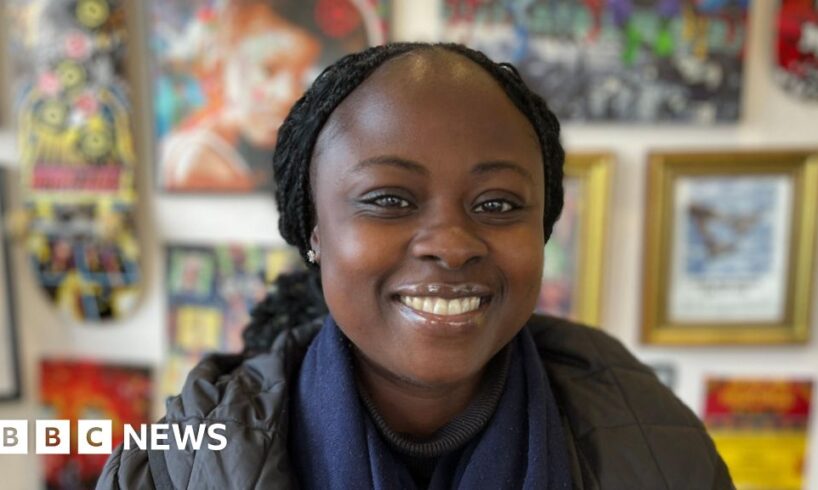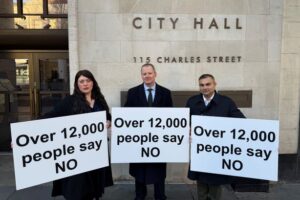
Simon DedmanEssex political reporter in Thurrock
BBC
Businesswoman Gina Bonsu has put recruitment on pause since last year’s Budget
On Wednesday, Chancellor Rachel Reeves will deliver her Budget, with speculation rife about those who will and won’t benefit this time around.
When she sat down in the Commons after delivering her first Budget in October 2024, her decisions had already left many in small businesses reeling from the changes.
Neil Woodbridge, who runs Thurrock Lifestyle Solutions, a social enterprise supporting people with disabilities in Thurrock, Essex, felt it would be “disastrous”.
He realised changes to national insurance (NI) that employers paid was going to cost thousands as he would be liable to pay it on more of his 200 carers.
He told the BBC on Budget Day last year it would cost about £4,000 a month.
In fact, it has cost an extra £8,000 a month.
“It has been a struggle,” he said.
“We had to make a decision to make less profit and the truth is it meant less staff pay rises. We would love to have given a per cent more than we were able to.”
What are his hopes for this year’s Budget?
‘Do the right thing on child benefit’
Neil Woodbridge said the NI changes cost Thurrock Lifestyle Solutions an extra £100,000 and impacted wage rises
“The demand is still huge in social care,” he added.
“The reality is if you can’t pay enough money you can’t attract staff. At the moment we could do with about 10 staff.
“But our wages are only just competitive for the local market.”
It has meant there is a waiting list for his care company’s services because they cannot offer higher pay.
“Disabled people themselves are having to wait whilst we recruit the staff,” he added.
Whilst he hopes his staff’s taxes don’t go up, he would welcome the removal of the two-child benefit cap if the chancellor removes it on Wednesday.
“There are four million children living in poverty,” he said.
“I’m hopeful the chancellor will do the right thing on child benefit.”
‘We cannot expand workforce’
Business and social enterprise owners in Thurrock watching the Budget last year
Gina Bonsu, a businesswoman from Grays, agrees with Mr Woodbridge about the cap.
“That will be great for our parents,” she said.
Ms Bonsu, 43, who owns the Mamma G’s store and runs U-Turnships social enterprise, says it hasn’t been easy since last year’s Budget.
“You can just see it with people coming in and their expenditure changing.
“We have weathered [the NI changes]. But in terms of us expanding our workforce and looking to take on more staff, we’ve actually made the decision to say not yet – and see how things pan out over the next few months.”
The main thing she wants is for people’s spending not to be restricted after the chancellor finishes her speech.
‘Charity has been curtailed’
“Social care has been left high and dry” by last year’s NI changes, says John Paddick.
The 67-year-old runs the Thurrock Centre for Independent Living, which provides legal advice to disabled people. It faces closure early next year.
Mr Paddick is semi-retired but still works in the charity sector.
“Cost savings have been translated into a shortage of services to people particularly in social care,” he adds.
“The charity which I am chief executive is likely going to have to wind up at the end of March because benefactors have constrained the money they have to spend and they are not as well-off.”
Mr Paddick says he has seen “a curtailment of charitable giving”.
‘Focus on the cost of living’
Dean Plunkett has noticed local NHS improvements at his surgery
Dean Plunkett, 32, runs Eazee Learning in Grays, which supports young people with Send. He is more positive about the impact of last year’s Budget.
“The NHS, I did see a difference when going to the doctors – the waiting time has reduced slightly. However, the A&E waiting time has increased,” he said.
He added that tax measures for self-employment “helped us out” and they had expanded into other parts of Essex in the past 12 months.
Mr Plunkett has high hopes for the Budget on Wednesday.
“I hope there is a lot of focus on the disability community, benefits and the cost of living,” he added.
” I hope they can channel what is needed in the right ways – look after the lower members of the community financially.”





